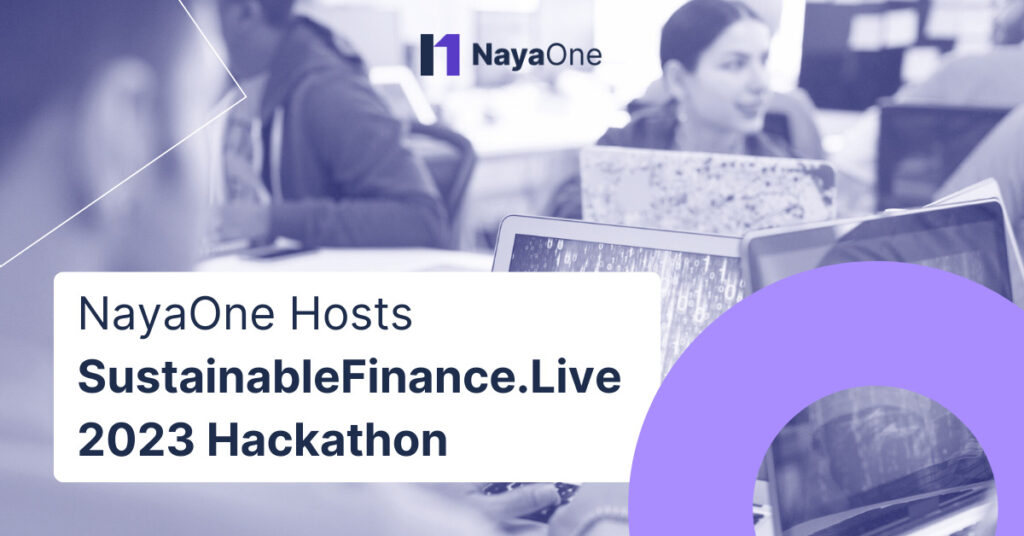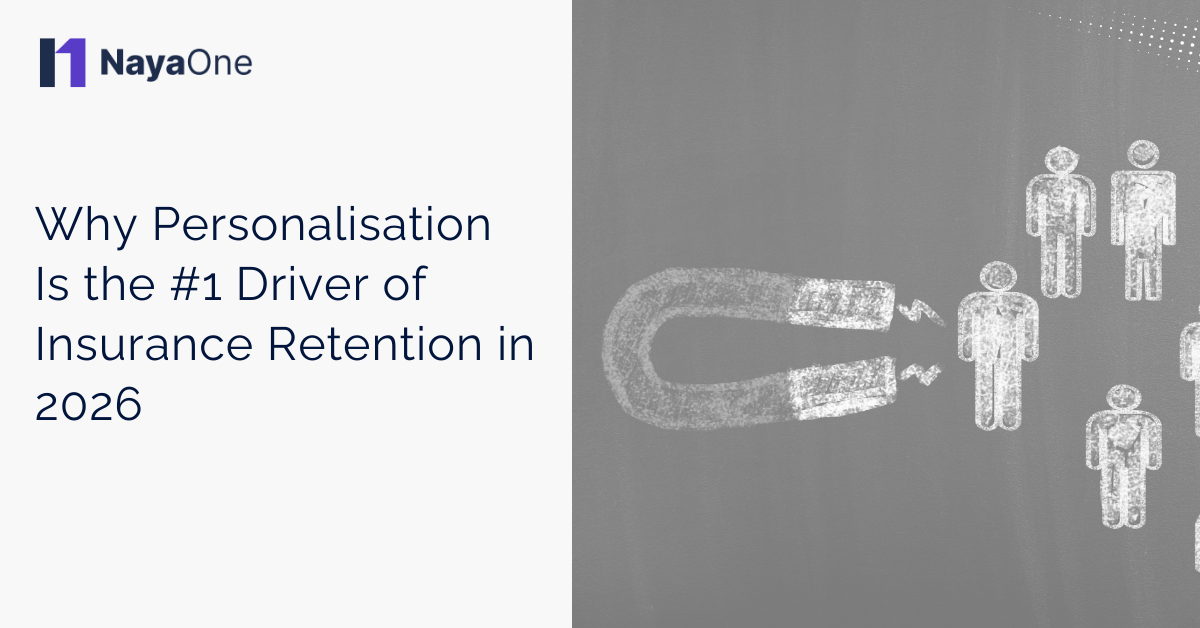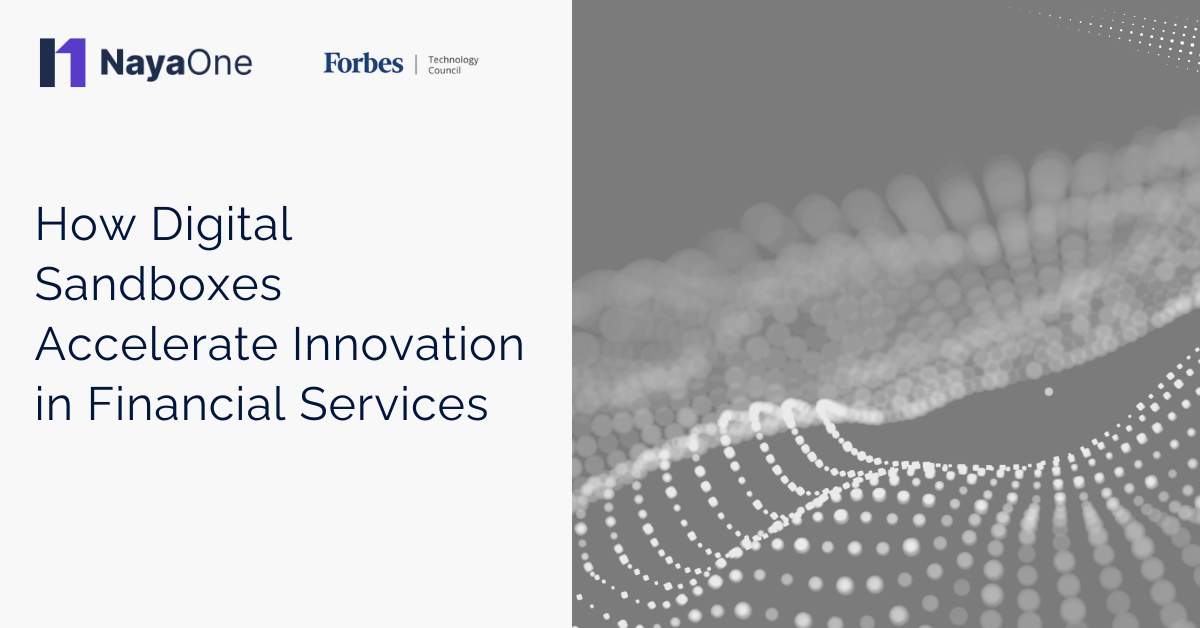
Amrit Satpathy
Ecosystem Manager
The Finextra hackathon is an annual event that brings together diverse groups of professionals, all sharing a common goal – to accelerate sustainable finance. Hosted by Finextra in collaboration with ResponsibleRisk Ltd, the hackathon is a catalyst for generating innovative ideas and solutions aimed at transforming our financial systems for a more ESG sustainable future.
The SustainableFinance.Live 2023 hackathon took place October 2-13, 2023, and marked its second consecutive year on the Hackathon Platform by NayaOne, a leading Tech Marketplace, Sandbox-as-a-Service, and Synthetic Data provider to banks and financial institutions. The SustainableFinance.Live 2023 hackathon was designed to create sustainable investment strategies with a focus on double materiality and aimed to foster an ecosystem of partnerships that would translate these strategies into reality.
Hackathons are usually centred around brainstorming and may never go past the ideation stage. This is something that the partnership between Finextra, ResponsibleRisk Ltd, and NayaOne aims to change. By hosting its hackathons on the NayaOne platform, Finextra offers hackathon participants the chance to move past the ideation stage and develop functional Proofs-of-Concepts, thus pushing the industry and innovation even further.
Let’s dive into the key highlights, challenges, and groundbreaking solutions presented during the SustainableFinance.Live 2023 hackathon.
The Purpose of the Finextra Sustainable Finance Hackathon
At its core, the Finextra hackathon aimed to address several critical objectives:
- Funding Sustainable Cities: One of the primary goals of the SustainableFinance.Live 2023 hackathon was to fund the transformation of cities into sustainable and eco-friendly hubs. This involved the allocation of capital for initiatives that promote sustainability, decarbonisation, and biodiversity gain.
- Value Creation through Double Materiality: The event emphasised the importance of trustworthy implementation of double materiality investment measures. In other words, it sought to create value through investments that align with economic and environmental objectives.
- Turning Words into Action: The event served as a platform to foster leadership and transform sustainable finance from a mere concept into actionable strategies.
The Use Cases
Participants from banks, consulting firms, financial institutions, and fintechs worldwide joined forces to tackle four key challenges:
- Geospatial Data and the Role of AI: This challenge centred around the use of geospatial data and artificial intelligence to address environmental and sustainability issues.
- De-risking the Entertainment Transition: The second challenge revolved around minimising the risks involved in transitioning to sustainable entertainment practices.
- Impact-Oriented Financial Instruments: The third challenge aimed to develop financial instruments that are focused on making a positive impact.
- Enabling a Just Transition: The final challenge sought to ensure that transitions to sustainability are fair and just for all parties involved.
Participant Teams and Their Proposed Solutions
The judges of the SustainableFinance.Live 2023 hackathon split participant teams into two categories:
- The ‘emerging’ category included participants from smaller organisations, while.
- The ‘established’ category was made up of teams from larger corporations.
After 1000s of API calls and data queries, 100s of data sets used, more than 150 hours of development time, 100s hours of ideation, and over 60 connections made with like-minded people, the proposed solutions were ready, and the judges announced the winners.
Team Thrive
Composed of Kristina Gosheva, Rohan Dikshit, Manish Bhutani, Asad Ateeque, Jon Mcinerney, Jon Boden, and Zeyno Yurddas from NatWest, the team won in the ‘established’ category. Team Thrive had a unique vision to build standardisation, accreditation, and accessibility into the assessment of non-financial returns.
The more traditional financial offerings focus solely on profitability and financial returns. Therefore, they often have various KPIs that can be verified with relative ease. However, this is not the case with impact investment, where this process is often bespoke, complex, and time-consuming. Moreover, despite constituting 99.9% of the UK private sector businesses, the SME market is underserved yet holds significant growth potential for impact investment.
Focusing on small and medium-sized enterprises (SMEs) in the UK, the team aimed to get the output through increased measurability and normalisation of impact verification. Its proposed solution was Thrive Hub, a platform that redefines support and empowerment for SMEs engaging in impact investment.
Thrive Hub can empower SMEs with specialised fields to embrace impact-based investment, even if they lack resources. It can also reduce potential exposure to greenwashing and increase participation in impact investment.
SustainableFinance.Live 2023 hackathon’s panel of judges identified Thrive Hub as the most “ready-to-go” solution.
Team 3 – We Succeed Together
Comprised of Ikechukwu Okoli, co-founder of Capsule Technology, and Arun Krishnankutty, managing consultant at Wipro, the team won in the ‘emerging’ category due to their idea on impact-orientated financial instruments.
We Succeed Together delved into the world of impact-linked financial instruments. Sustainable finance (SF) is a growing trend that is set to influence decision-making well into the future. Under the umbrella of SF, the space for impact-linked financial instruments is expanding rapidly. However, it faces a multitude of credibility challenges and market uncertainties.
In 2022, concerns arose as investors questioned the reliability of key performance indicators (KPIs) and sustainability performance targets (SPTs) while also scrutinising the incentives aimed at achieving these targets. Greenwashing and a lack of robustness are also negatively impacting the realm of impact-linked financial instruments.
As a result, the sector is experiencing exponential growth, but the volume of investments remains low. Outdated manual processes, including Excel-based systems, are still prevalent, impeding efficiency. Moreover, industry initiatives and frameworks are evolving but aren’t universally adopted, creating inconsistencies.
In response to these challenges, the team proposed a multifaceted solution that promises numerous advantages, such as:
- Increased credibility.
- Proper data governance and responsible data handling.
- Reduction in greenwashing.
Team First Derivative
Runner-up in the ‘established’ category, the team consisted of Joao Pedro Cerqueira, Shravani Navghare, Sanjyot Mestry, Federica Blumetti, Chris Keogh, Nomanur Rashid, Taylor Cavendish, Victoria McCormac, Daniel Cleary, and Johnny Mattimore from First Derivative.
The team focused on developing an OSF Data Product designed to address risk hazards associated with mortgage lender collaterals. This solution aims to produce geo-location hazard risk maps and reports, offering valuable insights to the financial industry. The team generated sample dummy data from regions in Sligo County, Ireland, and Florida, US, and visualised it via the NayaOne Hackathon Platform, enabling property searches with detailed information and loan data.
The proposed solution automates the ingestion of non-financial data and its integration with financial data, enabling rapid risk analysis and portfolio concentration through non-financial metrics. Additionally, it scales easily and accelerates decision-making for businesses, helping them transition towards new targets, including net-zero goals.
The judges appreciated the team’s determination to automate non-financial data integration with financial data.
Team 6 – SEEM
SEEM was the runner-up in the ‘emerging‘ category. It consisted of Seema Sutradhar, co-founder and co-CEO of SEEM, and focused on impact-oriented financial instruments.
The global financial landscape is facing a critical challenge in aligning private sector finance with sustainable development goals, climate change mitigation, and biodiversity protection. Despite more common bank-fintech partnerships aiming to address the problem and efforts like the World Bank’s private sector investment lab and the push for a centralised data repository, issues persist.
Leading financial institutions need help to innovate transition financing at scale for decarbonisation, and large corporations in essential sectors face hurdles in achieving a just net-zero transition while ensuring long-term sustainability. Moreover, greenwashing remains a pressing concern, urging a comprehensive solution.
To address these challenges, SEEM proposed a multi-faceted solution that integrates elements such as universal ESG measurements, standardised net-zero transition plans, policy support, and enhanced transparency.
The SustainableFinance.Live 2023 hackathon’s judges liked the solution’s intent to move from pure profit focus to sustainable profit.
Conclusion
The SustainableFinance.Live 2023 hackathon showcased remarkable innovations and solutions that have the potential to revolutionise the financial sector and drive sustainability. These solutions address challenges such as greenwashing, credibility, and market integrity, all while promoting collaboration, transparency, and measurable impact. As we move forward, these ideas and approaches will play a significant role in transforming our financial systems for a more sustainable and equitable future.
Are you, too, interested in organising a hackathon to resolve critical industry issues? The NayaOne Hackathon Platform provides access to leading industry APIs and datasets that allow participants to rapidly build and evaluate industry solutions as PoCs.





